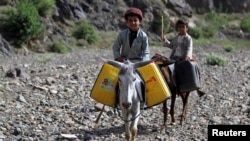GENEVA —
The United Nations Children’s Fund says it is optimistic that a new constitution being drafted in Yemen will improve the dire situation for children in the country.
The U.N. Children’s Fund said Yemen’s on-going national dialogue is giving the agency an opportunity to engage with decision makers who hope to establish a new constitution, possibly in the next two to three months.
Julien Harneis, UNICEF's resident representative in Yemen, said the guarantee of clean, sufficient water and the definition of a child as someone under age 18 are the two issues UNICEF wants to see included in the constitution.
Harneis said women and children have access to about six percent of Yemen’s water. The rest is used for commercial farming.
Harneis said about 20 percent of the population is registered at birth. So most people do not know their age. Yemen has signed an international human rights treaty that sets the age of a child as below 18 years.
But Harneis said this is not reflected in the country’s legislation. “So for example, the child marriage-there is no late age to prevent child marriage. So, we see significant percentages of the population who are married before the age of 18-both girls and boys," he explained. "And, we see children who are married at the age of nine and 10 years old. And, these are shocking issues and there is nothing-there is no law, which even refers to this.”
Harneis said Yemen’s laws on the death penalty are unclear, so people who were children when they were alleged to have committed crimes are due to be executed. Currently 25 children are on death row.
As Yemen struggles to recover from political and civil strife, Harneis said hundreds of schools are destroyed or damaged. He said the nutritional situation in the country is poor with 255,000 children suffering from severe to acute malnutrition.
“People not physically having access to food because of conflict or lack of money. But, then there is also chronic malnutrition and stunting. And, in terms of stunting… 58 percent of the country is stunted. And, that is among the highest stunting rates in the world… Chronic malnutrition is very much more of a development issue," Harneis stated. "It is about behavioral norms. It is about breast feeding, hand washing, access to clean water, etc.”
The recruitment of child soldiers was particularly acute during Yemen’s civil war. Now that the worst of the fighting is over, Harneis tells VOA the problem of child soldiers is still an issue but active recruitment has stopped.
The U.N. Children’s Fund said Yemen’s on-going national dialogue is giving the agency an opportunity to engage with decision makers who hope to establish a new constitution, possibly in the next two to three months.
Julien Harneis, UNICEF's resident representative in Yemen, said the guarantee of clean, sufficient water and the definition of a child as someone under age 18 are the two issues UNICEF wants to see included in the constitution.
Harneis said women and children have access to about six percent of Yemen’s water. The rest is used for commercial farming.
Harneis said about 20 percent of the population is registered at birth. So most people do not know their age. Yemen has signed an international human rights treaty that sets the age of a child as below 18 years.
But Harneis said this is not reflected in the country’s legislation. “So for example, the child marriage-there is no late age to prevent child marriage. So, we see significant percentages of the population who are married before the age of 18-both girls and boys," he explained. "And, we see children who are married at the age of nine and 10 years old. And, these are shocking issues and there is nothing-there is no law, which even refers to this.”
Harneis said Yemen’s laws on the death penalty are unclear, so people who were children when they were alleged to have committed crimes are due to be executed. Currently 25 children are on death row.
As Yemen struggles to recover from political and civil strife, Harneis said hundreds of schools are destroyed or damaged. He said the nutritional situation in the country is poor with 255,000 children suffering from severe to acute malnutrition.
“People not physically having access to food because of conflict or lack of money. But, then there is also chronic malnutrition and stunting. And, in terms of stunting… 58 percent of the country is stunted. And, that is among the highest stunting rates in the world… Chronic malnutrition is very much more of a development issue," Harneis stated. "It is about behavioral norms. It is about breast feeding, hand washing, access to clean water, etc.”
The recruitment of child soldiers was particularly acute during Yemen’s civil war. Now that the worst of the fighting is over, Harneis tells VOA the problem of child soldiers is still an issue but active recruitment has stopped.








